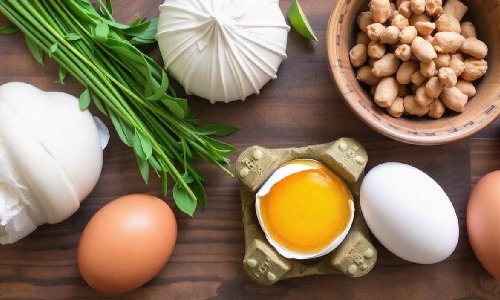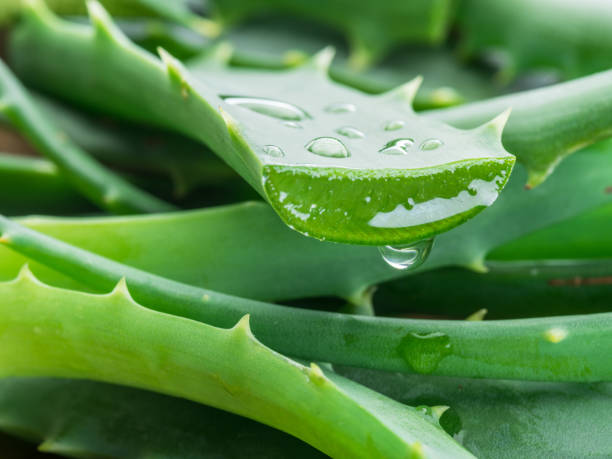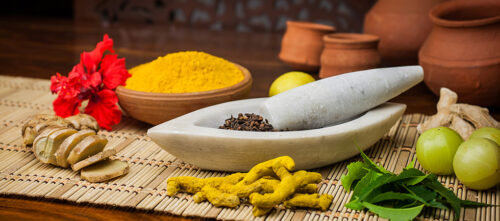Eggs are one kind of food that most non-vegetarians love. Many health experts suggest eating eggs daily as they provide high-quality protein, essential amino acids, and nutrients like B12 and choline, which support muscle growth, repair and overall strength. But what does Ayurveda say about eggs? Are they really good for everyone? Let’s find out! Ayurveda’s take on eggs One large egg contains about 6 grams of protein and 5 grams of fat, making it a nutrient-dense food. Hence, They are known for their ability to nourish the body. They are especially beneficial for individuals with Vata imbalances due to their heavy nature. However, they should be consumed cautiously by those with Pitta and Kapha imbalances. Ayurveda describes eggs as: सद्यः बालकृणि मधुराण्यभिष्यन्दिनि This means they provide instant strength and energy, are sweet in taste, increase mucus secretion and cause salivation. This makes them useful only for some people under certain conditions. For people recovering from surgery If someone has undergone surgery or has been very sick, their body needs extra nourishment to regain strength. Ayurveda suggests that eggs, especially when mixed with certain herbal formulations, can help in faster recovery. For those who are weak or malnourished If a person is extremely weak, they can provide quick nutrition. For improving male fertility Ayurveda recommends them as a medicine to enhance low sperm count. According to Charaka Samhita, eggs fried in ghee work as an aphrodisiac and can help improve sperm count. Instant energy booster They are often considered a “quick fix” for energy. When consumed properly, they can provide an immediate boost, especially for people who are in need of quick nourishment. This makes them a suitable choice during physically demanding days. But, in these cases, eggs are given in raw form, sometimes mixed with other medicines. These are heavy and nutritious, which is why Ayurveda sees them as a form of medicine rather than for daily consumption. Should everyone eat eggs ? The answer is no. Everyone eats eggs nowadays because they consider them a great source of protein. But they are not suitable for everyone. According to Ayurvedic principles, they can be a valuable part of your diet, but their suitability depends on your Dosha and current health condition. Ayurveda teaches us that food should be chosen based on our Dosha dominance (Vata, Pitta, Kapha). They are heavy, oily and heating, which means they don’t suit everyone equally, as they are often difficult to digest. Best for Vata Dosha People with a Vata imbalance (dry skin, weak digestion, low energy) can benefit from them in moderate amounts. The heaviness of eggs helps balance the lightness of Vata. Not ideal for Pitta Dosha Eggs increase heat in the body. If someone already has a Pitta imbalance (acidity, skin issues, anger, inflammation), eating them may make things worse. Not suitable for Kapha Dosha Since eggs are heavy and oily, they can increase Kapha imbalance, leading to weight gain, sluggishness, and mucus buildup, especially in large quantities. People with Kapha-dominant constitutions should avoid them. Understand Your Dosha It’s important to recognize your Prakriti (body type) and dominant Doshas. If you are unsure, it’s always a good idea to consult with an Ayurvedic doctor who can assess your specific needs. They can help you determine if it suit your unique body constitution and health goals. Does Ayurveda recommend eggs ? As mentioned above, Ayurveda recommends eggs for Vata people especially those who are weak to gain quick strength. However, Ayurveda considers them as unnatural food. Unlike fruits, grains, and vegetables that grow naturally, Ayurveda does not consider them a natural human food. Here’s why: Disturbs Dosha balance Instead of bringing harmony to the body, they can create imbalances. Tamasic Nature Ayurveda classifies foods based on their effect on the mind. Tamasic foods make the mind dull and heavy. Eggs, being Tamasic, can lead to stress, anger and fierceness. Bad energy Carrier According to Ayurvedic beliefs, eggs come from the hind part of the hen, which is considered impure. Consuming eggs may bring negative energy into the body. They’re a no-no in the Sattvic diet If you are aiming for a Sattvic (pure and balanced) diet, it’s best to limit eggs. This diet promotes clarity, peace and a positive mindset, and they are considered incompatible with such an approach. This is why Ayurveda generally does not recommend eggs as a regular part of a Sattvic (pure and balanced) diet. How to eat eggs the Ayurvedic way ? If you choose to eat eggs, here are some Ayurvedic guidelines to follow: Choose pastured and organic Avoid commercially raised eggs as they may contain harmful chemicals and can affect your digestion. Cook them properly but don’t overcook Overcooking destroys their nutrients. Soft-boiled or lightly cooked eggs are best. Pair with ghee Ayurveda suggests that frying eggs in ghee makes them more digestible and beneficial, especially for fertility. Listen to your body If eggs make you feel heavy, sluggish or uncomfortable, it’s best to avoid them. Balance with herbs If you’re eating it, consider pairing them with digestive herbs like ginger, turmeric or cumin to help with digestion and absorption. Moderation is key Do not consume eggs in large quantities, especially if you have weak digestion and are unsure how they affect your body. Ayurvedic wisdom advises moderation for everything – even the most beneficial foods. So, are eggs good or bad ? Eggs have their benefits, but they are not… Continue reading Are Eggs Healthy According to Ayurveda ?
Are Eggs Healthy According to Ayurveda ?









